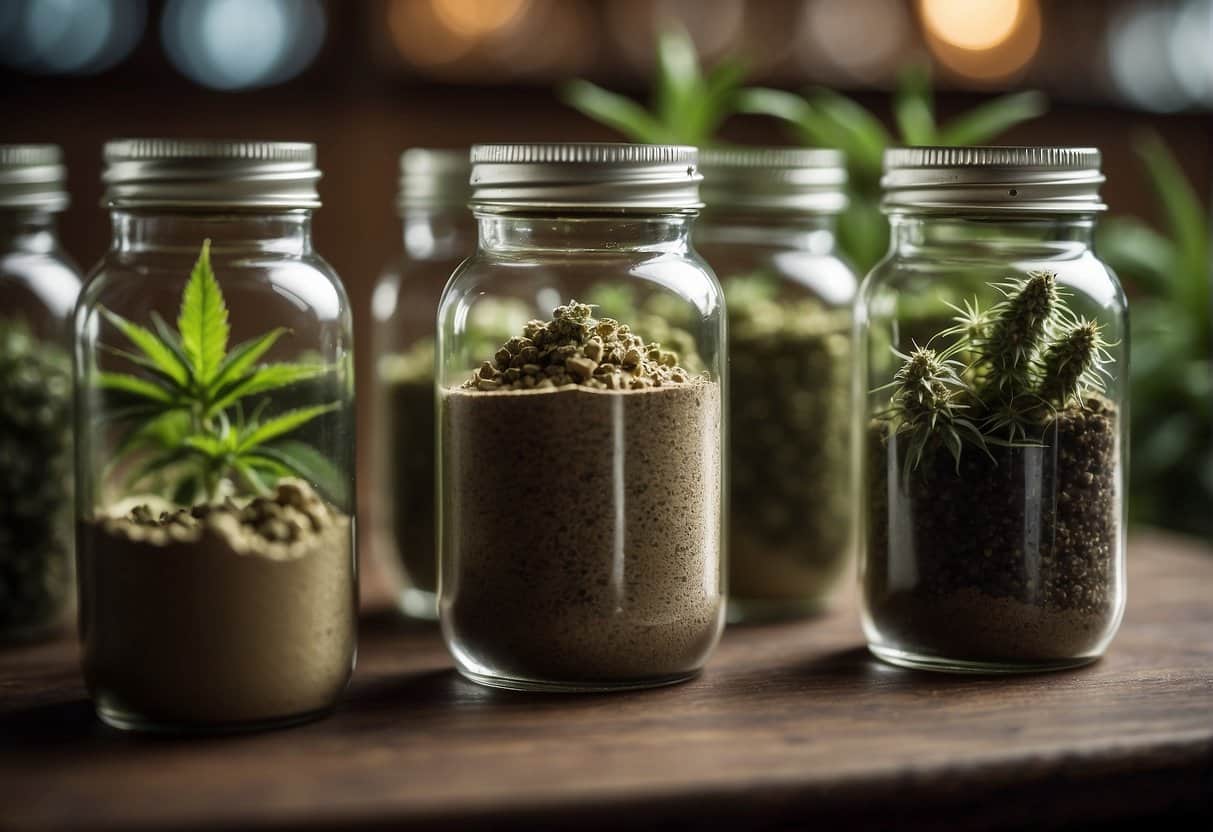What Is THCa Powder? Unveiling the Purest Concentrate of Cannabis
Dive into the dazzling realm of Tetrahydrocannabinolic acid, or THCa. This hidden treasure sits snug in the leafy parts of the marijuana plant, poised to amaze you. Most folks reckon THC is the lone star in cannabis’s sky, casting that well-known high. But hold up, there’s more beneath the surface! THCa is THC’s quiet cousin, playing a crucial role behind the scenes without the psychoactive spotlight. This ingredient that keeps you grounded won’t whisk you away, but it’s got a trick up its sleeve with decarboxylation. That’s when the real magic happens – drying or heating cannabis turns THCa into THC, like magic! If you’re all about wellness and curious about cannabis secrets, here’s your golden ticket to explore how THCa transitions into THC’s lively realm. Jump right into unveiling the hidden wonders of cannabis, crafted especially for enthusiasts like you!
Table of contents
- Understanding THCa Powder
- Production and Uses of THCa Powder
- Potential Health Benefits and Research
- Consumption Methods and Effects
- Legality, Drug Testing, and Industry Standards
- Decarboxylation and Activation
- Pharmacology and Dosing
- Potential Side Effects and Precautions
- The Role of Strains and Plant Varieties
- Additional Products and Innovations
- Frequently Asked Questions
- Can THCa powder induce psychoactive effects?
- What are the unique properties of THCa isolate compared to other cannabis concentrates?
- How can you incorporate THCa powder into cannabis flower usage?
- Is it possible to purchase THCa powder in bulk quantities for personal use?
- What are the general impressions from consumers who have used THCa powder?
- What are some effective methods for utilizing THCa isolate in edibles?
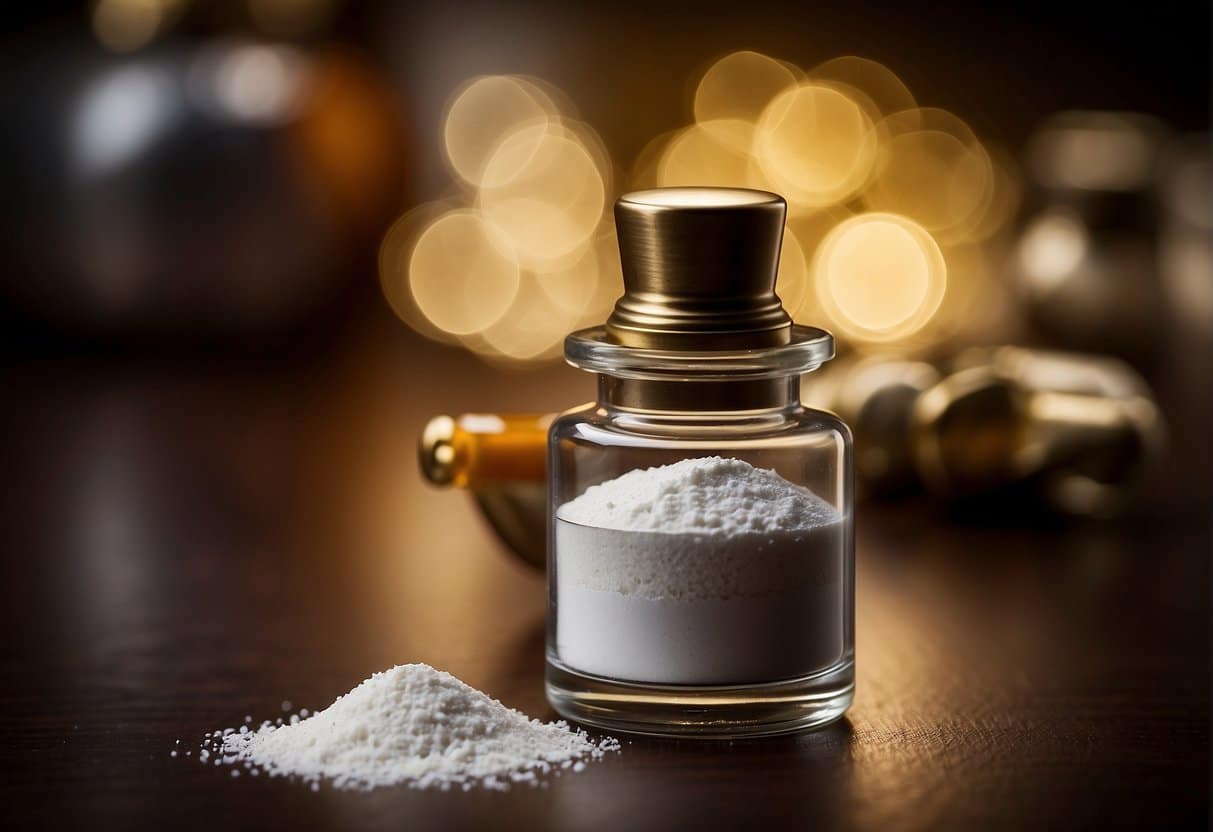
THCa powder, a product derived from cannabis, is gaining attention for its potential therapeutic benefits without the high associated with THC. Although research on THCa is still in its infancy compared to studies on THC and CBD, early investigations suggest that THCa could offer a range of health benefits, including anti-inflammatory and neuroprotective properties. It’s used by consumers who seek to leverage the benefits of the cannabinoid in a concentrated form, which can be incorporated into various methods of consumption such as adding to foods, beverages, or using it as a component of medical treatments.
Understanding the distinction between THCa and THC is crucial if you’re looking to explore the therapeutic landscape of cannabis without the psychoactivity. THCa powder represents an intriguing frontier of cannabis products that taps into a raw cannabinoid with a unique profile of effects and benefits. Whether you’re a medical patient seeking relief or a health-conscious consumer curious about cannabinoids, the exploration of THCa could provide a new avenue to achieve your wellness goals.
Understanding THCa Powder
As you explore the world of cannabinoids, THCa powder emerges as a noteworthy substance with unique properties and a distinct relationship to THC. This section will provide you with a focused look at THCa powder, offering clarity on its chemistry, how it compares to THC, and its presence in raw cannabis.
Definition and Chemistry
Tetrahydrocannabinolic acid (THCa) is a non-psychoactive precursor to delta-9-tetrahydrocannabinol (THC), the main psychoactive compound in cannabis. THCa powder is a refined concentration of this compound, typically extracted from raw cannabis. The molecular structure of THCa contains a carboxyl group that, upon heating, loses a carbon dioxide molecule in a process known as decarboxylation, converting THCa into psychoactive THC.
- Molecular Formula of THCa: C₂₂H₃₀O₄
- Molecular Formula of THC: C₂₁H₃₀O₂
Comparison with THC
Unlike THC, THCa is non-psychoactive, meaning it won’t produce the “high” associated with cannabis. When THCa powder is exposed to heat, it converts into THC, exhibiting its psychoactive effects. This transformation is significant for users seeking the therapeutic benefits of THC without the psychoactivity in its raw form.
- THCa: Non-psychoactive, used for its potential therapeutic properties.
- THC: Psychoactive, responsible for the euphoric effect.
Raw Cannabis and THCa
In raw cannabis, the majority of THC exists as THCa. Consuming raw cannabis offers the benefits of THCa without the psychoactive impact since the raw form lacks the heat necessary to convert THCa into THC.
- Raw Cannabis: Contains THCa and other cannabinoids in their acid form.
- Decarboxylation: A necessary step to activate THC from THCa for psychoactive results.
By understanding THCa powder, you gain insight into the broader spectrum of cannabinoids and their individual roles in both the plant’s life and in human consumption.
Production and Uses of THCa Powder
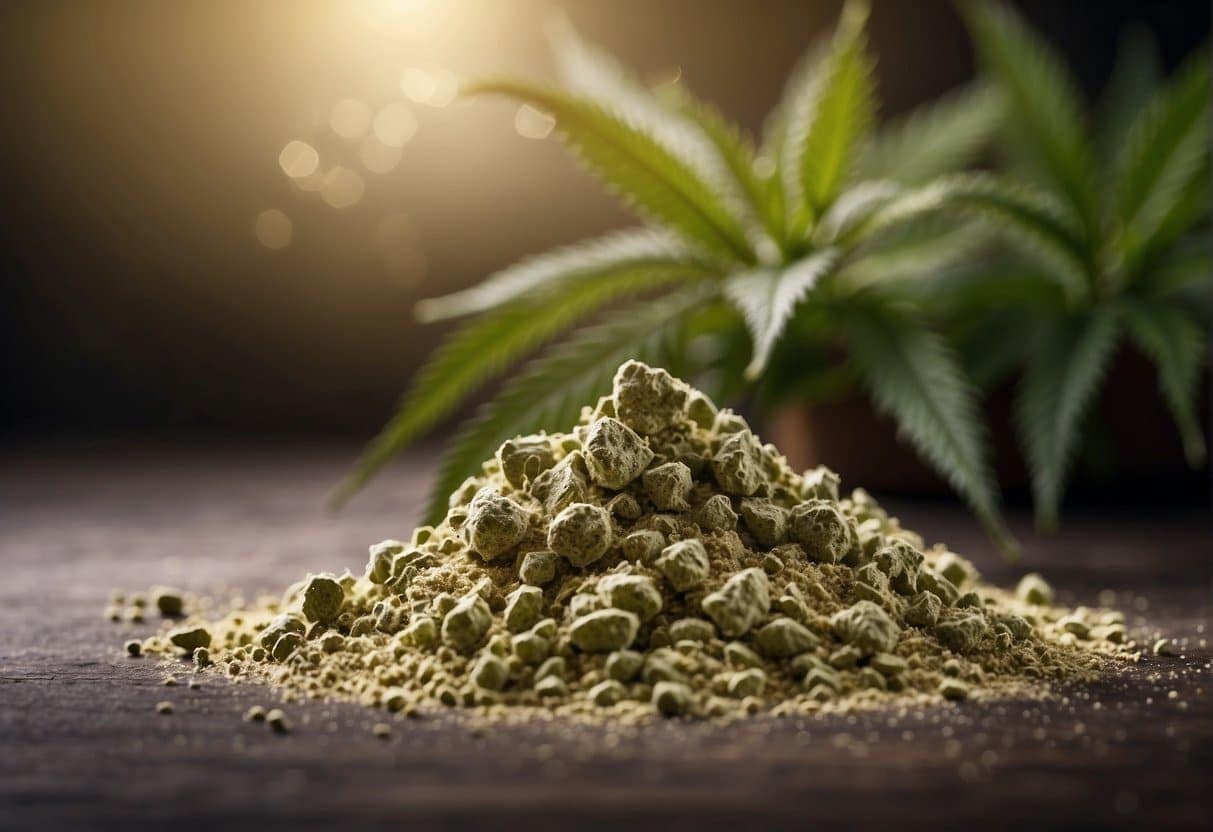
THCa powder is produced from cannabis plants through extraction processes that convert it into a versatile product. This non-psychoactive compound has various uses ranging from culinary applications to incorporation into cannabis products like edibles and tinctures.
Extraction Methods
The extraction of THCa from cannabis involves careful temperature control to prevent conversion into THC. Methods include:
- Cold-pressing: This mechanical process keeps the heat well below the point of decarboxylation, ensuring that THCa remains intact.
- Solvent-based extraction: Using solvents can yield high-purity THCa powder. Post-extraction, the substance is refined to eliminate solvents and impurities.
Common Forms and Products
THCa is found in several forms:
- Raw powder: Directly used in various products.
- Tinctures: For ease of dosing and use.
- Capsules: Convenient for controlled, consistent doses.
- Concentrates: Usually for medical applications.
Culinary Applications
When you have THCa powder, incorporate it into food without exposing it to high temperatures, which might convert it to THC. Some applications include:
- Juicing: Add THCa powder to fresh juice for a healthful beverage.
- Cooking: Introduce it into recipes after cooking to maintain its properties. For instance, sprinkle it onto a finished pizza or mix into a salad dressing.
Remember, always be mindful of dosage and the application method to ensure you don’t unintentionally convert it into its psychoactive form.
Potential Health Benefits and Research
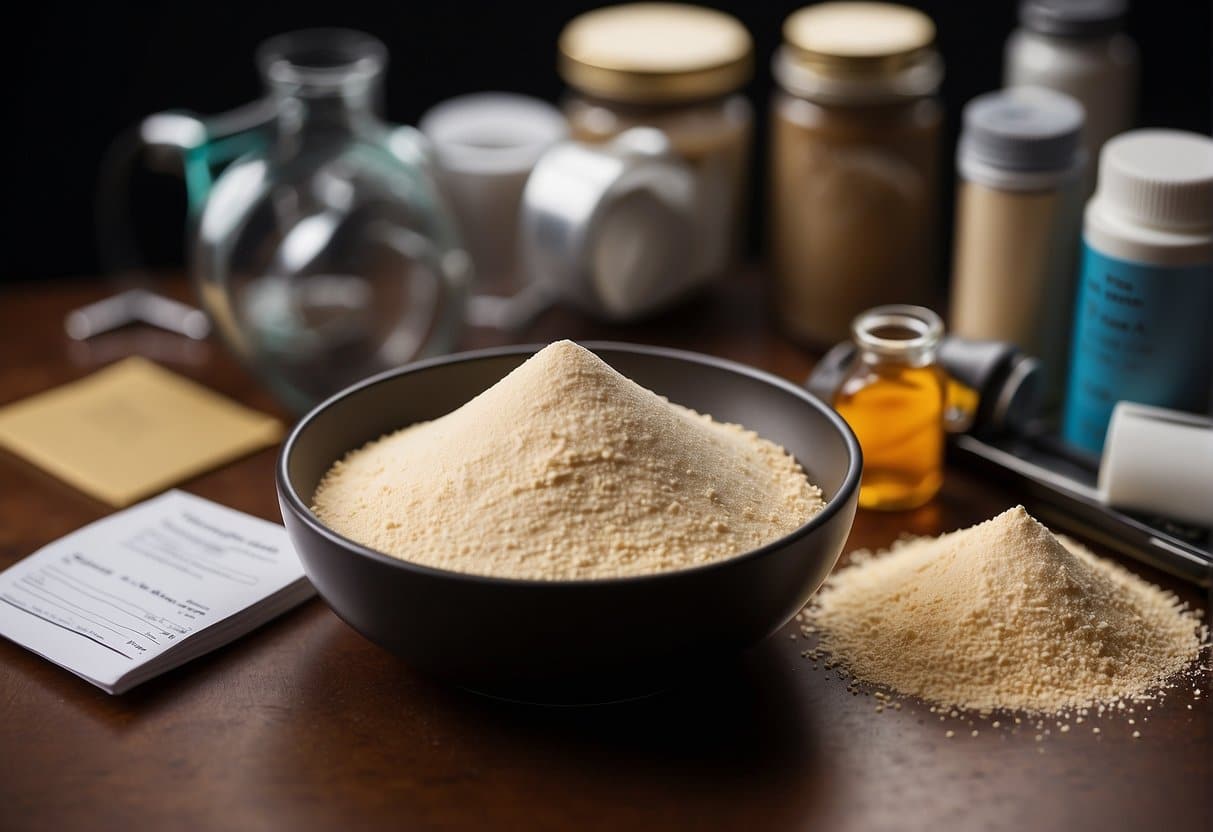
Recent studies have brought to light the potential health benefits of THCa powder, a non-psychoactive cannabinoid found in raw and unheated cannabis. Research indicates that THCa has unique properties that could be beneficial in treating certain medical conditions.
Medical Research and Studies
Research has shown that THCa might play a role in the treatment of various diseases. For instance, one study highlights how THCa may contribute to the treatment of medical conditions like ALS and lupus. Although these findings are promising, it’s important to note that most current data derives from preclinical research, necessitating further studies to fully understand THCa’s therapeutic potential.
Neuroprotective Effects
THCa has attracted attention for its neuroprotective effects, which could be significant in managing neurodegenerative diseases like Alzheimer’s disease. The compound’s structure allows it to help protect neural cells from damage and degeneration, suggesting a potential role in new treatments for such conditions.
Pain Relief and Anti-Inflammatory Properties
Dealing with chronic pain conditions such as arthritis and fibromyalgia can be challenging, but THCa shows promise in offering pain relief and anti-inflammatory properties. Its ability to modulate pain and reduce inflammation without the psychoactive effects associated with THC could make it a preferred option for patients seeking alternatives to conventional treatment options.
Consumption Methods and Effects
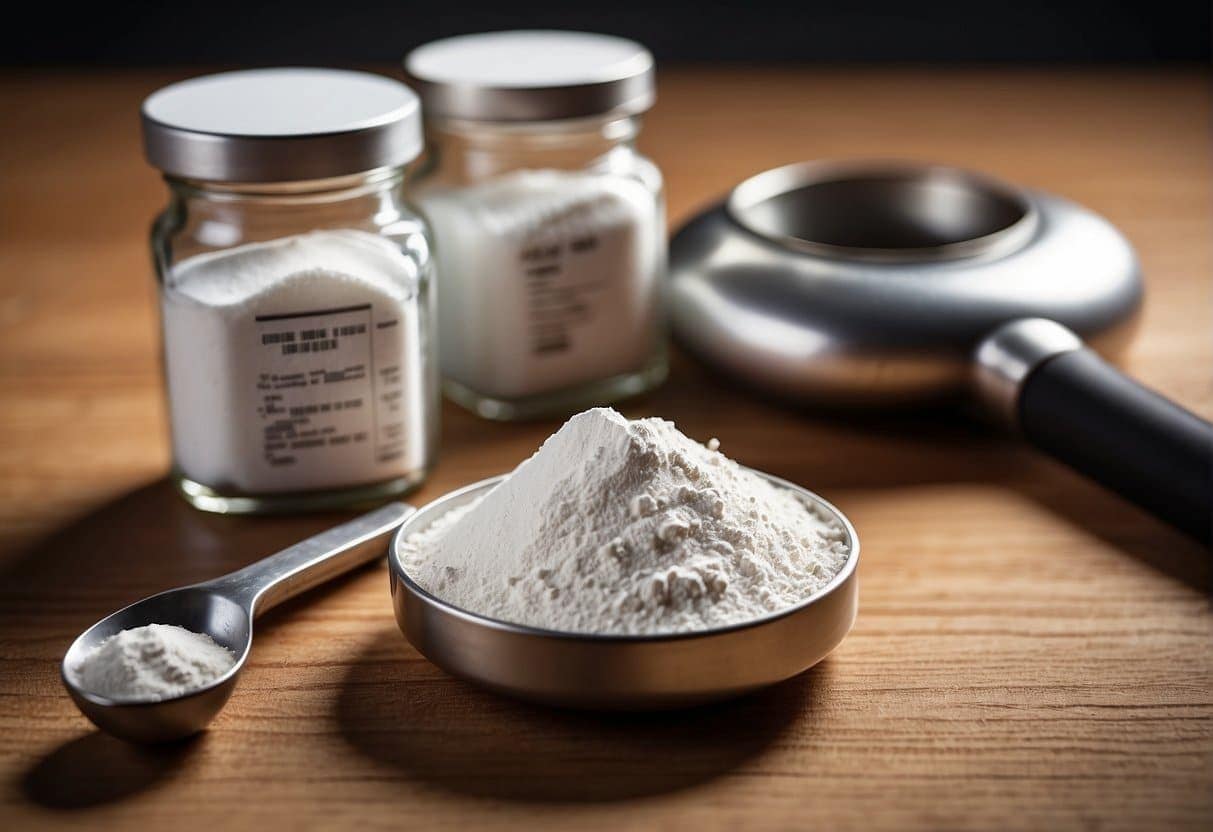
THCa powder provides versatile options for consumption, each method affecting your endocannabinoid system in unique ways. You can choose to vaporize, dab, ingest, or juice the powder, resulting in different onset times and intensity of effects.
Dabbing and Vaporizing
Dabbing involves a dab rig and THCa crystalline, where the powder is vaporized on a hot surface and inhaled. This method produces fast-acting effects due to the direct absorption of cannabinoids into your bloodstream. Similarly, vaping THCa powder allows for rapid onset of effects, as the active compounds are rapidly delivered to your cannabinoid receptors, particularly CB1 receptors in the brain, potentially producing psychoactive effects.
Juicing and Oral Consumption
For a non-psychoactive approach, juicing raw cannabis with THCa powder is a method embraced for its potential health benefits without the high. Oral consumption, such as incorporating THCa powder into edibles or capsules, offers a longer-lasting effect. When ingested, THCa is converted into THC by the body’s metabolism, influencing the endocannabinoid system more gradually than inhalation methods.
Impact on the Endocannabinoid System
Your endocannabinoid system plays a critical role in regulating various bodily functions. THCa’s interaction with this system, particularly through cannabinoid receptors, can influence physiological processes. Although THCa is not psychoactive like THC, when decarboxylated through methods such as smoking or dabbing, it can affect cognitive and physical sensations by activating CB1 receptors, which are predominantly found in the nervous system.
Legality, Drug Testing, and Industry Standards
Navigating the complexity of Tetrahydrocannabinolic acid (THCa) powder involves understanding its legal status, how it may affect drug testing, and the industry standards that govern its production. Your awareness in these areas is crucial as they can impact both use and marketability.
Legal Considerations
The legality of THCa powder differs globally, and within the United States, it varies from state to state. THCa is a non-psychoactive precursor to delta-9-tetrahydrocannabinol (THC), the active compound in cannabis. While hemp-derived products with less than 0.3% THC are federally legal under the Farm Bill, THCa can convert to THC through decarboxylation, which complicates its legal status. Stay informed about your local cannabis regulations to ensure compliance with state and federal laws.
Drug Test Detection
If you’re subject to drug testing, be aware that standard tests typically detect THC, not THCa. However, since THCa can convert into THC, a psychoactive substance that most drug tests screen for, consuming THCa might lead to a positive drug test result. It’s important to consider this, especially if you’re in an industry or situation where routine drug screenings are conducted.
Quality and Expertise in Production
The quality of THCa powder hinges on industry expertise and rigorous production standards. An increasing number of experts in the medicinal cannabis industry are advocating for the implementation of standardized laboratory testing to ensure product safety and consistency. High standards in production are critical, from accurate labeling of THCa content to contaminant screening, to establish a safety profile that aligns with industry benchmarks.
Remember, your knowledge of THCa powder’s legal framework, its detection in drug tests, and the industry’s commitment to high-quality production standards will provide a solid foundation for informed decisions and responsible use.
Decarboxylation and Activation
Understanding the transformation of THCA into THC is crucial if you’re exploring the potential benefits of cannabinoids. Through decarboxylation, a non-psychoactive compound becomes a powerful agent capable of providing the “high” associated with cannabis.
The Process of Decarboxylation
Decarboxylation is a chemical reaction that removes a carboxyl group and releases carbon dioxide (CO2). For cannabinoids like THCa, this process is vital for converting the non-psychoactive form into its active form, THC. Heat is the primary catalyst for decarboxylation. When you apply heat to THCa powder, the decarboxylation process transforms the molecule into tetrahydrocannabinol (THC), the primary psychoactive component in cannabis that is known to produce a “high”.
Activating THCa into THC
The conversion or activation of THCa into THC is not just about getting high; it’s about unlocking the full potential of the cannabinoid for both recreational and medicinal purposes. Ingesting THCa directly won’t cause psychoactive effects because it needs to be decarboxylated to become THC. This happens when the THCa is subjected to sufficient heat, such as when it is vaporized, smoked, or baked.
Terpenes and Flavors
Terpenes are the compounds that give cannabis its distinctive array of flavors and aromas. These compounds are sensitive to heat and can be degraded if not carefully managed during decarboxylation. The retention of terpenes during the heating process enhances the overall experience, as they contribute to the flavor and have their own therapeutic properties. It’s important to decarboxylate at a controlled temperature to preserve these terpenes and maintain the full flavor profile of the cannabis.
Pharmacology and Dosing
When exploring THCa powder, it’s essential to understand the pharmacological effects, accurately determine the dose and potency, and acknowledge the compound’s interactions with other cannabinoids for safe and effective usage.
Pharmacological Effects
Tetrahydrocannabinolic acid (THCa) is a non-psychoactive precursor to THC, which means that it typically doesn’t produce the “high” associated with THC. However, upon decarboxylation, which occurs when THCa is heated, it converts to psychoactive delta-9-tetrahydrocannabinol (Δ9-THC). This process enhances its affinity for cannabinoid receptors CB1 and CB2, which are distributed throughout your body, influencing various physiological processes.
Determining Dose and Potency
Determining the appropriate dose of THCa powder is complex due to variables such as individual tolerance, intended use, and the delivery method. Potency is often measured in milligrams (mg) of THCa per gram of product. A scale and lab testing can ensure accurate dosage. The effects of THCa and its converted form, Δ9-THC, are dose-dependent, so careful titration is necessary to achieve desired therapeutic outcomes without undesirable side effects.
- Start low and go slow: Begin with a smaller dose to gauge its effects.
- Lab reports: Look for certified lab analyses to confirm potency.
Interactions with Other Cannabinoids
THCa powder does not act in isolation; it’s part of the “entourage effect,” where it potentially synergizes with other cannabinoids like CBD, delta-8-tetrahydrocannabinol (Δ8-THC), and cannabidiolic acid (CBDA). These interactions can modulate the overall effects of cannabis products, influencing therapeutic benefits and side effects. While indica and sativa might hint at certain cannabinoid profiles, individual responses to these interactions are unique.
- Synergy: Other cannabinoids can alter the efficacy and side effects of THCa.
- Cannabinoid profile: Consider the entire spectrum of cannabinoids present.
Remember, your response to cannabinoids is personal, and adjusting your dose accordingly is crucial for optimal results.
Potential Side Effects and Precautions
When considering the use of THCa powder, you should be aware of the potential side effects and the importance of taking precautions to avoid negative reactions. The following sections will guide you through key considerations for specific conditions, and how to responsibly use THCa powder to minimize risks.
Negative Reactions
Effects: THCa powder typically doesn’t produce the psychoactive effects that THC does, as it’s a non-psychoactive cannabinoid. However, if it’s exposed to heat, THCa can convert into THC, leading to possible psychoactive effects, including anxiety and impaired focus.
- Nausea and Vomiting: Although some users take THCa to alleviate nausea, in some cases, it can ironically induce nausea and vomiting if not dosed properly.
- Burn: When creating dabs from THCa powder, the extreme heat required can cause burns if not handled with care.
Precautions for Specific Conditions
If you have existing health conditions, particularly related to sleep or anxiety disorders, exercise caution with THCa powder.
- For sleep disturbances: While some find THCa helpful for sleep, it can exacerbate problems for others.
- For anxiety: Monitor your response to THCa, as it may vary considerably from person to person, potentially heightening anxiety symptoms in sensitive individuals.
Responsible Use
- Dosing: Start with a low dose to assess your tolerance and reaction to THCa powder.
- Temperature: Ensure that any beverage or substance mixed with THCa powder is cooled to below 195 degrees Fahrenheit, as higher temperatures can cause THCa to convert to THC, bringing about unwanted psychoactive effects as noted in research from MüV Florida.
- Equipment: Use appropriate equipment for handling THCa powder, especially if you are preparing dabs, to prevent accidents such as burns.
The Role of Strains and Plant Varieties
When you explore THCa powder, understanding the significance of different cannabis strains and plant varieties is crucial. These factors largely determine the potency and spectrum of cannabinoids, including THCa, present in the cannabis plant.
Indica vs Sativa Strains
Indica and Sativa are the two primary strains of cannabis plants that affect the synthesis of THCa, a non-psychoactive cannabinoid in its acidic form. Indica strains tend to produce a more relaxing effect, which can be attributed to their typically higher concentrations of cannabinoids and terpenes. On the other hand, Sativa strains often have a more stimulating impact, which might connect to their terpenoid profiles that differ from those of Indicas.
Influence of Strains on Effects
The effects you feel from consuming various cannabis products, including those made from raw cannabis flower or cannabis joints, are heavily influenced by the plant’s strain. The cannabinoid profile, which includes THCa, varies between strains; some may calm you while others energize. This biochemical diversity can help tailor products to your desired effects, whether it’s for relaxation or stimulation.
Breeding for THCa Richness
Selective breeding practices have been employed to cultivate cannabis strains with varying levels of THCa. This cannabinoid, found in the flower of the plant, can be converted to THC when heated. By focusing on genetic profiles and chemical characteristics, cultivators aim to produce strains that not only maximize the yield of THCa but also preserve its integrity in products like THCa powder. The documented variability in cannabinoid profiles among different strains demonstrates the complexity and potential of breeding specifically for cannabinoid content.
Additional Products and Innovations
In the evolving cannabis industry, THCa powder is incorporated in a variety of products, each offering different methods of delivery and potential benefits. These innovative applications are designed to cater to your diverse preferences and needs.
Transdermal Patches and Topicals
Transdermal Patches: You’ll find that transdermal patches offer a discreet and controlled release of THCa into your bloodstream over time. They’re designed to provide consistent dosing, which can be ideal for managing symptoms that require long-term, steady relief.
Topicals: Topicals, including creams and lotions infused with THCa powder, are applied directly to your skin. They allow for localized relief of discomfort and inflammation without significant systemic effects.
Concentrates and Extracts
Cannabis Concentrates: THCa powder is also a key ingredient in various cannabis concentrates, such as shatter and wax. These potent products are favored for their high purity and are often consumed via dabbing or vaporization, offering immediate effects.
Cannabis Extracts: The process of creating extracts like oils and tinctures preserves not just THCa, but other valuable cannabinoids and terpenes. This maximizes the entourage effect, which could enhance the therapeutic potential of the products.
Future Trends in THCa Products
As you explore the future of THCa products, expect to see an uptick in innovation and industry growth. New forms of THCa powder-based products are likely to emerge, focusing on improving bioavailability and offering diverse application methods to meet your personal health and wellness goals.
Advancements may also leverage the synergy between various cannabinoids and terpenes, further enhancing the potential benefits of THCa while maintaining a safety profile that aligns with your health-conscious lifestyle.
Frequently Asked Questions
Understanding the specifics of THCa powder can better equip you to make informed decisions regarding its use and benefits. This section sheds light on some of the most commonly posed inquiries.
Can THCa powder induce psychoactive effects?
THCa powder does not cause psychoactive effects because THCa is the non-psychoactive acidic precursor to THC. It only becomes psychoactive once it has been decarboxylated, which involves heat transforming THCa into THC.
What are the unique properties of THCa isolate compared to other cannabis concentrates?
THCa isolate stands out due to its high purity and concentration of THCa, often exceeding 99%. Unlike full-spectrum concentrates, they lack other cannabinoids and terpenes, offering a singular compound with targeted potential benefits.
How can you incorporate THCa powder into cannabis flower usage?
You can sprinkle THCa powder over your ground cannabis flower to enhance its potency. Additionally, it can be used in the creation of homemade cannabis infusions without adding the psychoactive effects that come with THC.
Is it possible to purchase THCa powder in bulk quantities for personal use?
Legality varies by region, but in areas where cannabis is legal, THCa powder may be available for purchase in bulk from licensed dispensaries or retailers that cater to customers with a medical prescription or for adult use.
What are the general impressions from consumers who have used THCa powder?
Consumers often report a positive response to THCa powder, citing its potential for relieving discomfort without the psychoactive effects of THC. The focus on its singular compound allows for tailored use.
What are some effective methods for utilizing THCa isolate in edibles?
When using THCa isolate in edibles, it’s critical to avoid heating the product beyond its decarboxylation point if you wish to retain the properties of THCa. You can mix it into foods or beverages served at lower temperatures or combine it with other ingredients post-cooking.

